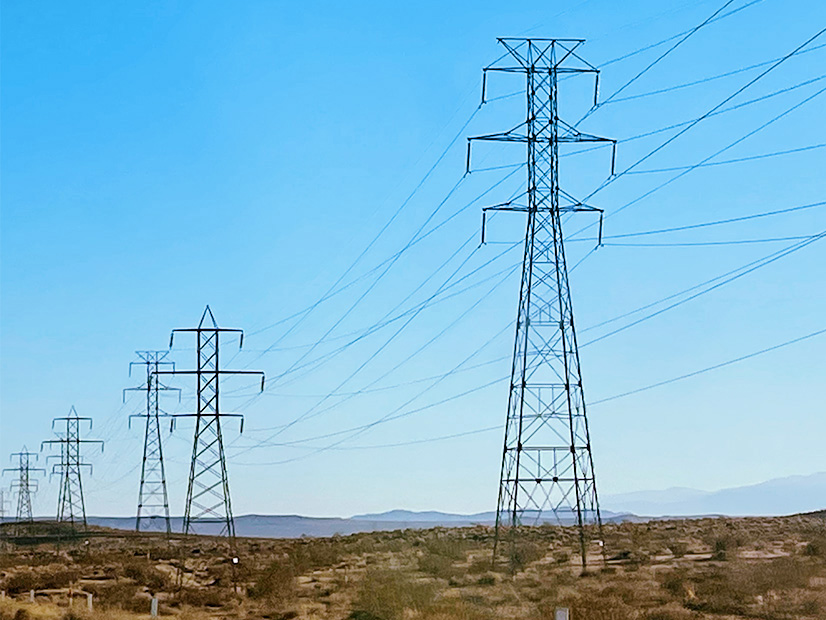
A bill to accelerate the development of new transmission lines in California passed the state Senate Tuesday on a vote of 36-0 and is now headed for the lower house.
Senate Bill 619 would expand the authority of the California Energy Commission (CEC) by extending the agency’s existing “opt-in” permitting process to include new transmission lines that require a capital investment of at least $250 million over five years — although many such projects would still be excluded.
While not part of Gov. Gavin Newsom’s recently introduced legislative package to expedite the development of clean energy resources through looser permitting, SB 619 falls in line with the governor’s efforts, which last week took on a new sense of urgency. (See Newsom Stresses Role of Permitting in Calif. Energy Transition.)
“California’s efforts to build the clean energy supply of the future will fall flat if we rely on the grid of the past,” bill sponsor Sen. Steve Padilla (D) said in a statement Tuesday. “We must act now, to approve new projects and expand our transmission capacity. The state needs to triple the size of our grid over the next decade, and we are falling behind every single day.”
The CEC’s opt-in process is the product of a 2022 law (AB 205) that authorized the agency to create a new certification and permitting program that allows developers of non-emitting energy resources and related facilities — including transmission — to optionally seek approval from the CEC instead of a local permitting authority.
To be eligible for the process, a project must qualify under California’s Environmental Leadership Development Project program, which entails stringent environmental and labor provisions. SB 619 would expand the CEC permitting process to also include point-to-point transmission lines that function as more than just tie-ins for generating or storage resources.
‘Substantial Delays’
Under current California law, developers of point-to-point lines are prohibited from beginning construction before obtaining a certificate of public convenience and necessity (CPCN) from the California Public Utilities Commission — or, in the case of publicly owned utilities (POUs), a permit from a local authority.
The CPUC’s CPCN process includes both an environmental review under the California Environmental Quality Act (CEQA) and an evaluation of project need and costs. Critics — including Padilla — have blamed that process for the lack of needed new transmission in California.
“Despite the overwhelming need to expand our electrical grid, the California Public Utilities Commission has not authorized a new transmission project in over a decade,” the senator’s office said in its statement. “The current process requires multiple agencies, duplicative analyses, and permitting processes that take years to complete and create unnecessary cost overruns and substantial delays.”
SB 619 would allow a subset of transmission developers to circumvent those processes by opting into CEC review. But even if it passes, the bill might have a limited role in spurring construction of new transmission. That’s because it explicitly states that it will not contravene the CPUC’s oversight over transmission lines proposed by any utility falling under CPUC jurisdiction, which includes Pacific Gas and Electric, Southern California Edison and San Diego Gas & Electric — the investor-owned utilities that serve more than half the state.
“The supporters of this bill acknowledge this limitation and recognize that additional work would be needed to make any changes to the existing CPUC’s authority related to permitting transmission projects,” said a bill analysis provided to senators before the floor vote. “Instead, this bill would capture a more limited set of transmission projects, those serving publicly-owned utilities (POUs), which would otherwise be permitted by local governments.”
According to the analysis, bill supporters include Clean Air Task Force, Clean Power Campaign, 350 Humboldt: Grassroots Climate Action, Elders Climate Action and San Diego Community Power.
“SB 619 is a much-needed reform to expedite approvals of badly needed new transmission, to expand solar, wind, and batteries, and enhance affordability and reliability,” V. John White, legislative director for Clean Power Campaign, said in a statement after Tuesday’s vote.
The Senate’s advancement of SB 619 could herald the passage of similar bills from Newsom’s legislative package. Those include proposals to streamline judicial review of certain clean energy and transportation projects by requiring that challenges under the CEQA be resolved within 270 days and a related measure to streamline procedures for the preparation of the public record for court review of CEQA challenges.

